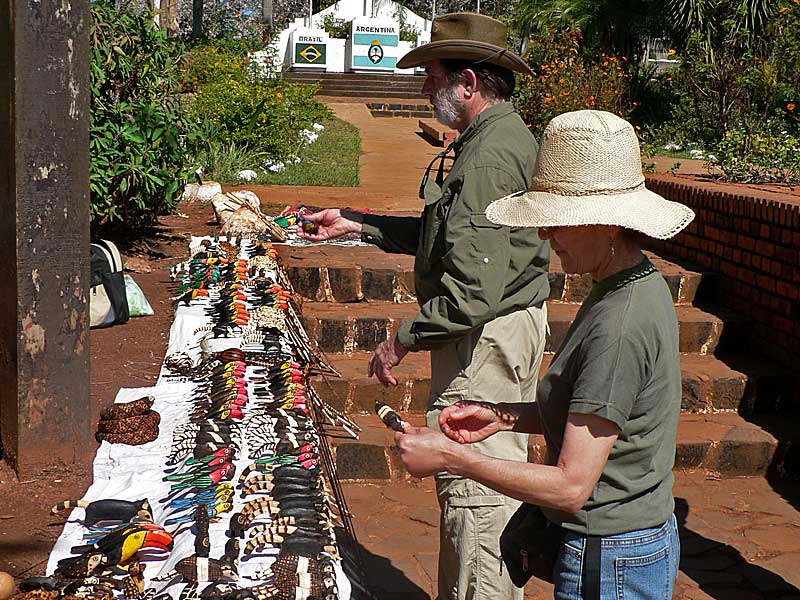Families living in Mbya communities that are located along major routes in Misiones Province, like the communities in the Cuña Pirú and Guapoy, often set up kiosks by the side of the road to attract passing tourists. In contrast, families from Fortin Mbororé and Yryapú sell their handicrafts in the streets of Puerto Iguazú, at the Iguazú National Park, and to tourists who visit their communities.
More than a decade ago, the leaders of Fortin Mbororé contracted with a Puerto Iguazú tourist agency, Cuenca del Plata, to bring tourists to the community for guided tours through selected areas of the village. These tours culminate with a performance by the children’s choir and a visit to a market place set up by community artisans. A large variety of handicrafts are for sale, along with CDs and DVDs of the choir. In addition to these sales, the tours provide an income for the Mbya tour guides, many of whom have recently been trained in the Project MATE school in Yryapú. Over the years of this tour program, the paths have been extended and several small mud and log replicas of ancient housing, along with a small opy and benches for seating, have been built. Many of the children have been performing for five to ten years, as they can sing in one of the community’s three choirs until they are teenagers. According to a representative from Cuenca del Plata, approximately 86% of the fees charged by the tourist agency for the visit to Fortin Mbororé are returned to the 85 Mbya families who work on the project.
Tourism is an essential economy for the community of Fortin Mbororé because there is not enough land to support its residents through rainforest resources and horticulture. But as the community has moved to a more western business model than seen in most Mbya communities, there have been some negative outcomes. Because some families in Fortin Mbororé can earn money for food, clothing, and medicine through these tours, there is now economic stratification within the community, with some individuals or families having more access to consumer goods than others. Another negative impact has been that many of the children and adolescents had been drawn toward western ideas of society and behavior, including drinking, using drugs, gambling, and begging in the streets of Puerto Iguzú. Over the past several years the cacique has banned younger members of the community from visiting of Puerto Iguzú, especially during the evening hours.
The community of Yryapú receives only a few tourists who arrive on their own. However handicrafts can be purchased from a few tables in a location in the community that is near a newly constructed road that leads to the highway. In the future, the number of tourists who visit may increase once more hotels are built in the neighboring section of the area known as the “600 hectares.” At the present time the community has constructed an area for guided tours and this area is also used for training guides in the Project MATE school.
In the Valley of the Cuña Pirú, the communities of Kaaguy Poty, Yvy Pytú, and Kapií Poty are located along Route 7 in a mountainous region in the center of the province. Families sell their handicrafts and other natural products in kiosks at the side of the road, but the selection of goods is smaller than those seen in the major tourist centers and parks in Misiones Province. With the encouragement of the municipal authorities of the nearby town of Aristóbulo del Valle, some of the communities members set up a museum where they exhibit Mbya technology that is used in traditional subsistence activities. Tourists stopping at the kiosks are encouraged to visit the museum to learn more about the Mbya culture.
In 2007, the Council of Caciques and the provincial government dedicated the month of July to Mbya Guaraní heritage and culture. A festival was held on the city square in Posadas, the capital of the province, throughout the month where handicrafts and other products from communities across the province were displayed and sold. Additionally workshops and ceremonies that were both celebratory and informative of the culture were held, and individuals from a variety of indigenous cultures in Argentina attended. Since that time the festival has been held on an irregular basis, usually in the city of Puerto Iguazú, where more tourists visit than Posadas.
The Jesuit ruins at San Iganacio Miní and the Salto Encantado Park are other tourist centers where a variety of handicrafts can be found. Additionally many hotel gift shops and tourist shops in the province sell Mbya handicrafts, including large baskets and wooden carvings that are difficult to find at roadside kiosks. Recently some Mbya handicrafts have been for sale in Buenos Aires, often in the area of the Sunday antique market in the San Telmo neighborhood.

